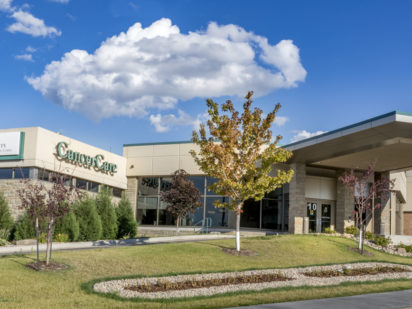The addition of a second linear accelerator at Trinity CancerCare Center offers new treatment opportunities for patients and help with treatment-related downtimes.
The linear accelerator customizes various high energy x-rays and electrons to target differing tumor shapes and sizes within many different areas of the body, including but not limited to the breast, prostate, lung, abdomen, pelvis, and brain.
“Linear accelerators are utilized to deliver radiation treatments to patients. They offer many different treatment opportunities such as image-guided or stereotactic radiotherapy that enables oncologists to treat the most challenging cancer cases with speed and precision,” explained Shane Jordan, director of Trinity CancerCare Center. “These machines use noninvasive tumor-destroying radiation to treat cancers throughout the body while minimizing exposure to surrounding healthy tissue, thereby enhancing the success of the therapy.”
Prior to obtaining this new machine, the CancerCare Center utilized a single linear accelerator to support the growing number of patients in the region. “The current linear accelerator was installed in 2012 and has been utilized greatly over the past eight years,” Jordan said, noting that the added features with the new machine will also be added to that linear accelerator, thus providing two cutting-edge treatment machines with identical capabilities.
The life span of a linear accelerator generally depends on the overall use of the system and part availability, due to changes in design as technology continues to advance. The current linear accelerator has been utilized to routinely treat 25 to 40 patients per day, which would equal somewhere between moderate and high use; because of this, there are increased risks of a machine going “down,” which can cause schedule delays, as well as delays in efficient patient treatment. Service on these machines can take anywhere from one day to one week, depending on the issue at hand.
In 2019, the existing linear accelerator faced downtime situations nine out of the 12 months. During these downtime events, patients encounter either delayed or missed treatments. Jordan noted that with this second machine, the CancerCare Center can continue to meet the growing volume of patients and continue to offer the most advanced and best treatment options, while providing radiation treatment services closer to home.
The purchase of the linear accelerator was made possible in part by the Trinity Health Foundation.

